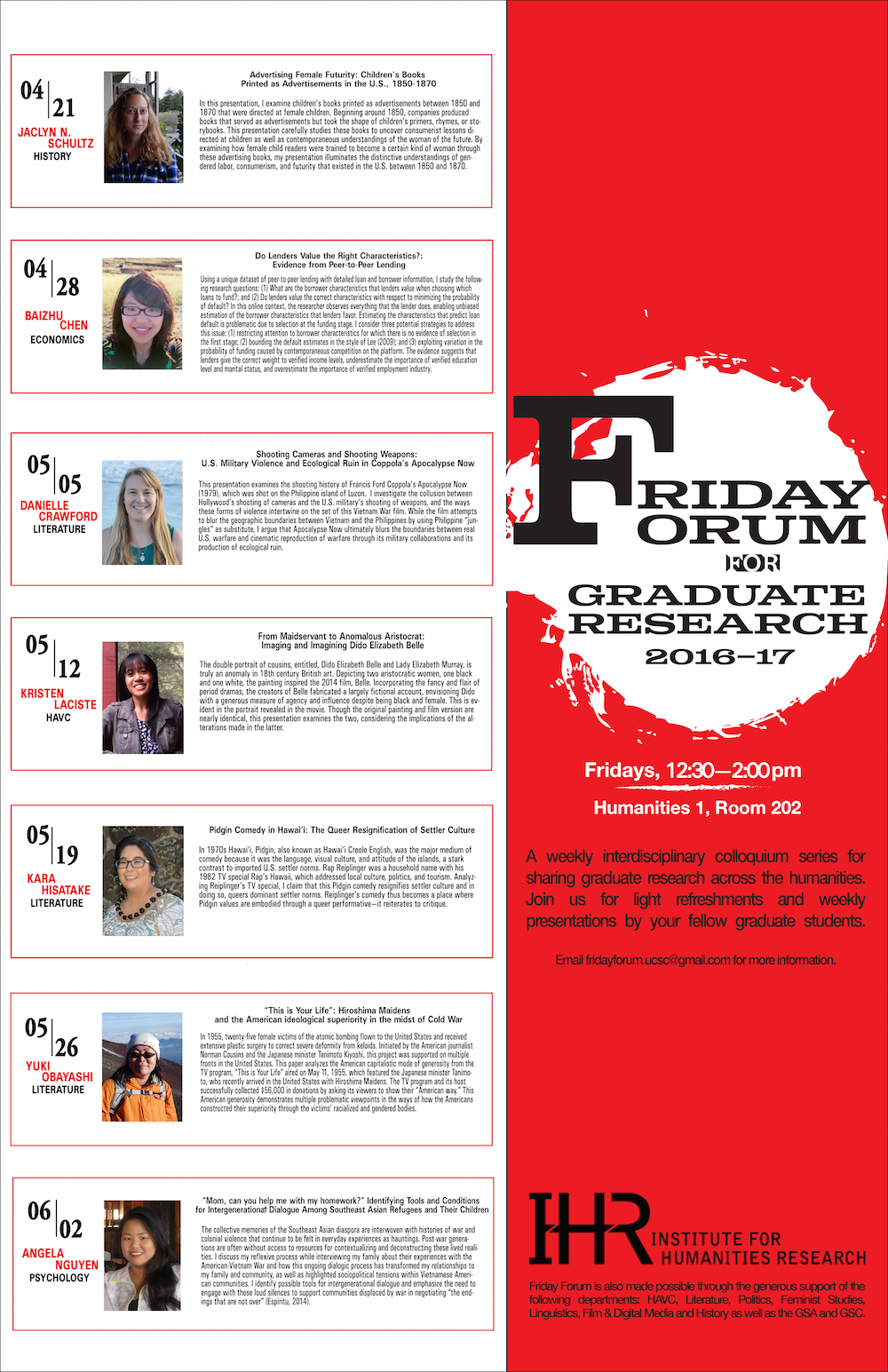Events
Friday Forum for Graduate Research
Events from this organizer

Friday Forum for Graduate Research: Yulia Gilichinskaya
Humanities 1, Room 202Israel and Palestine: The Landscape of Separation The Palestinian people in Gaza and the West Bank not only live under the occupation of Israel but also, contained behind the Wall that Israel erected, populate a space of physical, social, and cultural isolation. The Wall severs communities, people's access to services, livelihoods and religious and cultural […]
FREE
Friday Forum for Graduate Research: Maggie Wander
Humanities 1, Room 202"Its Ok, We're Safe Here": Cultural and Eco Activism in the Film Windjarrameru (The Stealing C*nt$) Since 2008, the Karrabing Film Collective has made four films about the various cultural, political, and social realists of being Aboriginal in twenty-first century Australia. Their 2015 film, Windjarrameru (The Stealing C*nt$), highlights how social inequalities experienced every day […]
free
Friday Forum for Graduate Research: Chessa Adsit-Morries
Humanities 1, Room 202Creative Ecologies of Practice: Collaborative Agential Modes of Eco-Aesthetic Pedagogy This presentation will discuss two collaborative environmental art projects aimed at creating experimental and experiential trans-disciplinary pedagogical practices. Both projects are examples of "creative ecologies of practice" enabling and requiring multiple modes of thought, multiple modes of encounter, and multiple modes of pedagogy. They are […]

Friday Forum for Graduate Research: Baizhu Chen
Humanities 1, Room 202Do Lenders Value the Right Characteristics?: Evidence from Peer-to-Peer Lending Using a unique dataset of peer-to-peer lending with detailed loan and borrower information, I study the following research questions:|1) What are the borrower characteristics that lenders value when choosing which loans to fund?; and (2) Do lenders value the correct characteristics with respect to minimizing […]

Friday Forum for Graduate Research: Danielle Crawford
Humanities 1, Room 202Shooting Cameras and Shooting Weapons: U.S. Military Violence and Ecological Ruin in Coppola's Apocalypse Now This presentation examines the shooting history of Francis Ford Coppola's Apocalypse Now (1979), which was shot on the Philippine island of Luzon. I investigate the collision between Hollywood's shooting of cameras and the U.S. military's shooting of weapons, and the […]

Friday Forum for Graduate Research: Kristen Laciste
Humanities 1, Room 202From Maidservant to Anomalous Aristocrat: Imaging and Imagining Dido Elizabeth Belle The double portrait of cousins, entitled, Dido Elizabeth Belle and Lady Elizabeth Murray, is truly an anomaly in 18th century British art. Depicting two aristocratic women, one back and one white, the painting inspired the 2014 film, Belle. Incorporating the fancy and flair of […]

Friday Forum for Graduate Research: Kara Hisatake
Humanities 1, Room 202Pidgin Comedy in Hawai'i: The Queer Resignification of Settler Culture In 1970s Hawai'i, Pidgin, also known as Hawai'i Creole english, was the major medium of comedy because it was the language, visual culture, and attitude of the islands, a stark contrast to imported U.S. settle norms. Rap Reiplinger was a household name with his 1982 […]
Free
Friday Forum for Graduate Research: Yuki Obayashi
Humanities 1, Room 202"This is Your Life": Hiroshima Maidens and the American ideological superiority in the midst of the Cold War In 1955, twenty-five female victims of the atomic bombing flown to the United States and received extensive plastic surgery to correct severe deformity from keloids. Initiated by the American journalist Norman Cousins and the Japanese minister Tanimoto […]

Friday Forum for Graduate Research: Angela Nguyen
Humanities 1, Room 202"Mom, can you help me with my homework?" Identifying Tools and Conditions for Intergenerational Dialogue Among Southeast Asian Refugees and Their Children The collective memories of the Southeast Asian diaspora are interwoven with histories of war and colonial violence that continue to be felt in everyday experiences as hauntings. Post-war generations are often without access […]
Steven Haug: “Community in Heidegger’s Philosophy of Art”
Humanities 2, Room 359In order for a work of art to be great, according to Heidegger, at least one of the conditions it must meet is the community condition. While this condition is discussed much less in the literature than the relation of art to truth in Heidegger, it is of more consequence. It is art’s inability to […]
